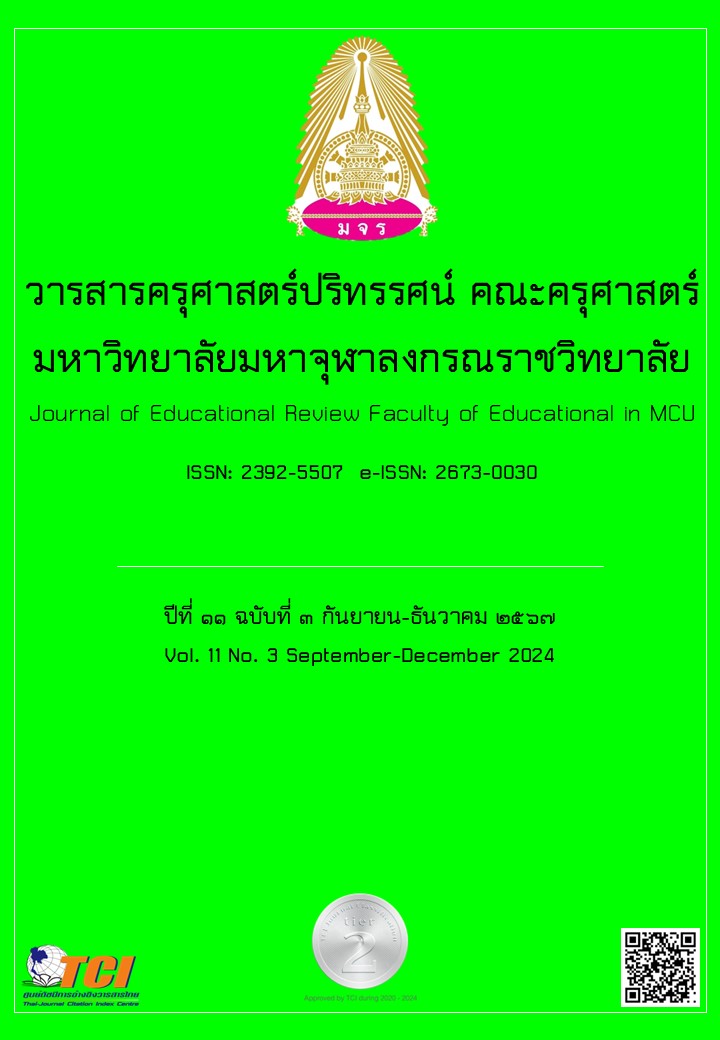THE BUDDHIST PSYCHOLOGICAL PROCESSES INFLUENCING FAITH IN BUDDHISM AMONG THE PEOPLE OF KUSHINAGAR, UTTAR PRADESH, INDIA
Main Article Content
Abstract
This research aims to 1) study the faith in Buddhism of Indians, 2) develop the process of Buddhist psychology that affects the faith in Buddhism of Indians, and 3) present the process of Buddhist psychology that affects the faith in Buddhism of Indians. This qualitative research consisted of interviews with 15 key informants, divided into Buddhist religious leaders in India, namely the head of the Thai Dharma Missionary Mission in India-Nepal and the abbot of a Buddhist temple in Kusinagara, India, and Indian Buddhists. A focus group discussion was held with 11 qualified persons. Data were analyzed using content analysis. The research results found that 1) the faith in Buddhism of Indians was divided into 2 types: social faith and religious faith. 2) The development of the process of Buddhist psychology that affected the faith in Buddhism of Indians was as follows: (1) The principle of the process of Buddhist psychology that affected the faith in Buddhism of Indians. The principle of faith of Indians came from the experience of perception from the senses and the perception of emotions. (2) The method of the process of Buddhist psychology that affected the faith in Buddhism of Indians consisted of holding the limit, listening to the sound from outside, thinking by oneself. (3) The results of Buddhist psychological processed affecting the faith in Buddhism of Indians included Indians having the right way of life and not clinging to and abandoning desires, cultivating mindfulness and having the determination to practice to escape suffering. And 3) The Buddhist psychological processed affecting the faith in Buddhism of Indians included (1) holding limits, (2) listening to external sounds, (3) thinking for oneself, and (4) practicing for oneself in order to create good relationships among religious people, religious leaders and communities, and strengthening religion and people's faith.
Article Details

This work is licensed under a Creative Commons Attribution-NonCommercial-NoDerivatives 4.0 International License.
ทัศนะและความคิดเห็นที่ปรากฏในบทความในวารสารฉบับนี้ถือเป็นความรับผิดชอบของผู้เขียนบทความนั้นเพียงผู้เดียว และไม่ถือเป็นทัศนะและความรับผิดชอบของกองบรรณาธิการ
กองบรรณาธิการขอสงวนสิทธิ์ในการคัดเลือกบทความลงตีพิมพ์และจะแจ้งให้เจ้าของบทความทราบหลังจากผู้ประเมินบทความตรวจอ่านบทความแล้ว
ต้นฉบับที่ได้รับการตีพิมพ์ในวารสารครุศาสตร์ปริทรรศน์ คณะครุศาสตร์ มหาวิทยาลัยมหาจุฬาลงกรณราชวิทยาลัย ถือเป็นกรรมสิทธิ์ของคณะครุศาสตร์ มหาวิทยาลัยมหาจุฬาลงกรณราชวิทยาลัย ห้ามนำข้อความทั้งหมดหรือบางส่วนไปพิมพ์ซ้ำ เว้นเสียแต่ว่าจะได้รับอนุญาตจากมหาวิทยาลัยฯ เป็นลายลักษณ์อักษร
References
พระธรรมปิฎก (ประยุทธ์ ปยุตฺโต). (2539). จากจิตวิทยาสู่จิตภาวนา. พิมพ์ครั้งที่ 6. กรุงเทพมหานคร: มูลนิธิพุทธธรรม.
พระพรหมคุณาภรณ์ (ป. อ. ปยุตฺโต). (2551). พจนานุกรมพุทธศาสตร์ ฉบับประมวลศัพท์ (ชำระ-เพิ่มเติมช่วงที่ 1). พิมพ์ครั้งที่ 11. กรุงเทพมหานคร: โรงพิมพ์มหาจุฬาลงกรณราชวิทยาลัย
พระพรหมคุณาภรณ์ (ป. อ. ปยุตฺโต). (2553). พจนานุกรมพุทธศาสน์ ฉบับประมวลศัพท์. พิมพ์ครั้งที่ 15. กรุงเทพมหานคร: โรงพิมพ์สหธรรมิก.
พระราชวัลภาจารย์ และพระครูสังฆรักษ์ทรงพรรณ ชยทตฺโต. (2565). ต้นแบบหลักสูตรการสร้างภูมิคุ้มกันมรดกทางวัฒนธรรมและพิทักษ์ผลประโยชน์สาธารณะของชุมชน. วารสารครุศาสตร์ปริทรรศน์ คณะครุศาสตร์ มหาวิทยาลัยมหาจุฬาลงกรณราชวิทยาลัย. 9(1). 1-12.
มหาจุฬาลงกรณราชวิทยาลัย. (2539). พระไตรปิฎกภาษาไทย ฉบับมหาจุฬาลงกรณราชวิทยาลัย. กรุงเทพมหานคร: มหาจุฬาลงกรณราชวิทยาลัย.
สมเด็จพระพุทธโฆษาจารย์ (ป. อ. ปยุตฺโต). (2559). พุทธธรรม ฉบับปรับขยาย. พิมพ์ครั้งที่ 6. กรุงเทพมหานคร: มูลนิธิธรรมทานกุศลจิต


